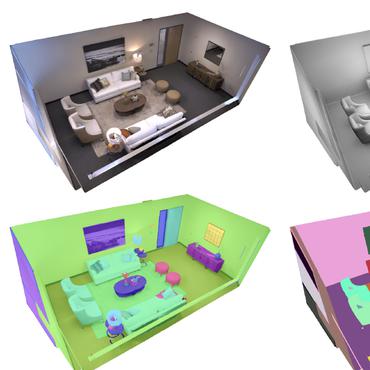Search Results for author: Ming C. Lin
Found 19 papers, 5 papers with code
GAN-based Garment Generation Using Sewing Pattern Images
no code implementations • ECCV 2020 • Yu Shen, Junbang Liang, Ming C. Lin
The generation of realistic apparel model has become increasingly popular as a result of the rapid pace of change in fashion trends and the growing need for garment models in various applications such as virtual try-on.
DMesh: A Differentiable Representation for General Meshes
no code implementations • 20 Apr 2024 • Sanghyun Son, Matheus Gadelha, Yang Zhou, Zexiang Xu, Ming C. Lin, Yi Zhou
We present a differentiable representation, DMesh, for general 3D triangular meshes.
Gradient Informed Proximal Policy Optimization
1 code implementation • NeurIPS 2023 • Sanghyun Son, Laura Yu Zheng, Ryan Sullivan, Yi-Ling Qiao, Ming C. Lin
We introduce a novel policy learning method that integrates analytical gradients from differentiable environments with the Proximal Policy Optimization (PPO) algorithm.
Dynamic Mesh-Aware Radiance Fields
1 code implementation • ICCV 2023 • Yi-Ling Qiao, Alexander Gao, Yiran Xu, Yue Feng, Jia-Bin Huang, Ming C. Lin
Embedding polygonal mesh assets within photorealistic Neural Radience Fields (NeRF) volumes, such that they can be rendered and their dynamics simulated in a physically consistent manner with the NeRF, is under-explored from the system perspective of integrating NeRF into the traditional graphics pipeline.
NeuPhysics: Editable Neural Geometry and Physics from Monocular Videos
no code implementations • 22 Oct 2022 • Yi-Ling Qiao, Alexander Gao, Ming C. Lin
We present a method for learning 3D geometry and physics parameters of a dynamic scene from only a monocular RGB video input.
Differentiable Hybrid Traffic Simulation
no code implementations • 14 Oct 2022 • Sanghyun Son, Yi-Ling Qiao, Jason Sewall, Ming C. Lin
To compute the gradient flow between two types of traffic models in a hybrid framework, we present a novel intermediate conversion component that bridges the lanes in a differentiable manner as well.
Human Body Measurement Estimation with Adversarial Augmentation
no code implementations • 11 Oct 2022 • Nataniel Ruiz, Miriam Bellver, Timo Bolkart, Ambuj Arora, Ming C. Lin, Javier Romero, Raja Bala
Training of BMnet is performed on data from real human subjects, and augmented with a novel adversarial body simulator (ABS) that finds and synthesizes challenging body shapes.
Differentiable Simulation of Soft Multi-body Systems
1 code implementation • NeurIPS 2021 • Yi-Ling Qiao, Junbang Liang, Vladlen Koltun, Ming C. Lin
We present a method for differentiable simulation of soft articulated bodies.
3D-MOV: Audio-Visual LSTM Autoencoder for 3D Reconstruction of Multiple Objects from Video
no code implementations • 5 Oct 2021 • Justin Wilson, Ming C. Lin
Our neural network produces high-quality 3D reconstructions using voxel representation.
Echo-Reconstruction: Audio-Augmented 3D Scene Reconstruction
no code implementations • 5 Oct 2021 • Justin Wilson, Nicholas Rewkowski, Ming C. Lin, Henry Fuchs
Reflective and textureless surfaces such as windows, mirrors, and walls can be a challenge for object and scene reconstruction.
Voice Aging with Audio-Visual Style Transfer
no code implementations • 5 Oct 2021 • Justin Wilson, Sunyeong Park, Seunghye J. Wilson, Ming C. Lin
Face aging techniques have used generative adversarial networks (GANs) and style transfer learning to transform one's appearance to look younger/older.
Efficient Differentiable Simulation of Articulated Bodies
3 code implementations • 16 Sep 2021 • Yi-Ling Qiao, Junbang Liang, Vladlen Koltun, Ming C. Lin
We derive the gradients of the forward dynamics using spatial algebra and the adjoint method.
Improving Robustness of Learning-based Autonomous Steering Using Adversarial Images
no code implementations • 26 Feb 2021 • Yu Shen, Laura Zheng, Manli Shu, Weizi Li, Tom Goldstein, Ming C. Lin
For safety of autonomous driving, vehicles need to be able to drive under various lighting, weather, and visibility conditions in different environments.
Scalable Differentiable Physics for Learning and Control
3 code implementations • ICML 2020 • Yi-Ling Qiao, Junbang Liang, Vladlen Koltun, Ming C. Lin
Differentiable physics is a powerful approach to learning and control problems that involve physical objects and environments.
Differentiable Physics Simulation
no code implementations • ICLR Workshop DeepDiffEq 2019 • Junbang Liang, Ming C. Lin
Differentiable physics simulation is a powerful family of new techniques that applies gradient-based methods to learning and control of physical systems.
Shape-Aware Human Pose and Shape Reconstruction Using Multi-View Images
no code implementations • ICCV 2019 • Junbang Liang, Ming C. Lin
We propose a scalable neural network framework to reconstruct the 3D mesh of a human body from multi-view images, in the subspace of the SMPL model.
 Ranked #102 on
3D Human Pose Estimation
on Human3.6M
Ranked #102 on
3D Human Pose Estimation
on Human3.6M
ISNN: Impact Sound Neural Network for Audio-Visual Object Classification
no code implementations • ECCV 2018 • Auston Sterling, Justin Wilson, Sam Lowe, Ming C. Lin
3D object geometry reconstruction remains a challenge when working with transparent, occluded, or highly reflective surfaces.
Learning-Based Cloth Material Recovery From Video
no code implementations • ICCV 2017 • Shan Yang, Junbang Liang, Ming C. Lin
To extract information about the cloth, our method characterizes both the motion space and the visual appearance of the cloth geometry.
Detailed Garment Recovery from a Single-View Image
no code implementations • 3 Aug 2016 • Shan Yang, Tanya Ambert, Zherong Pan, Ke Wang, Licheng Yu, Tamara Berg, Ming C. Lin
Most recent garment capturing techniques rely on acquiring multiple views of clothing, which may not always be readily available, especially in the case of pre-existing photographs from the web.










